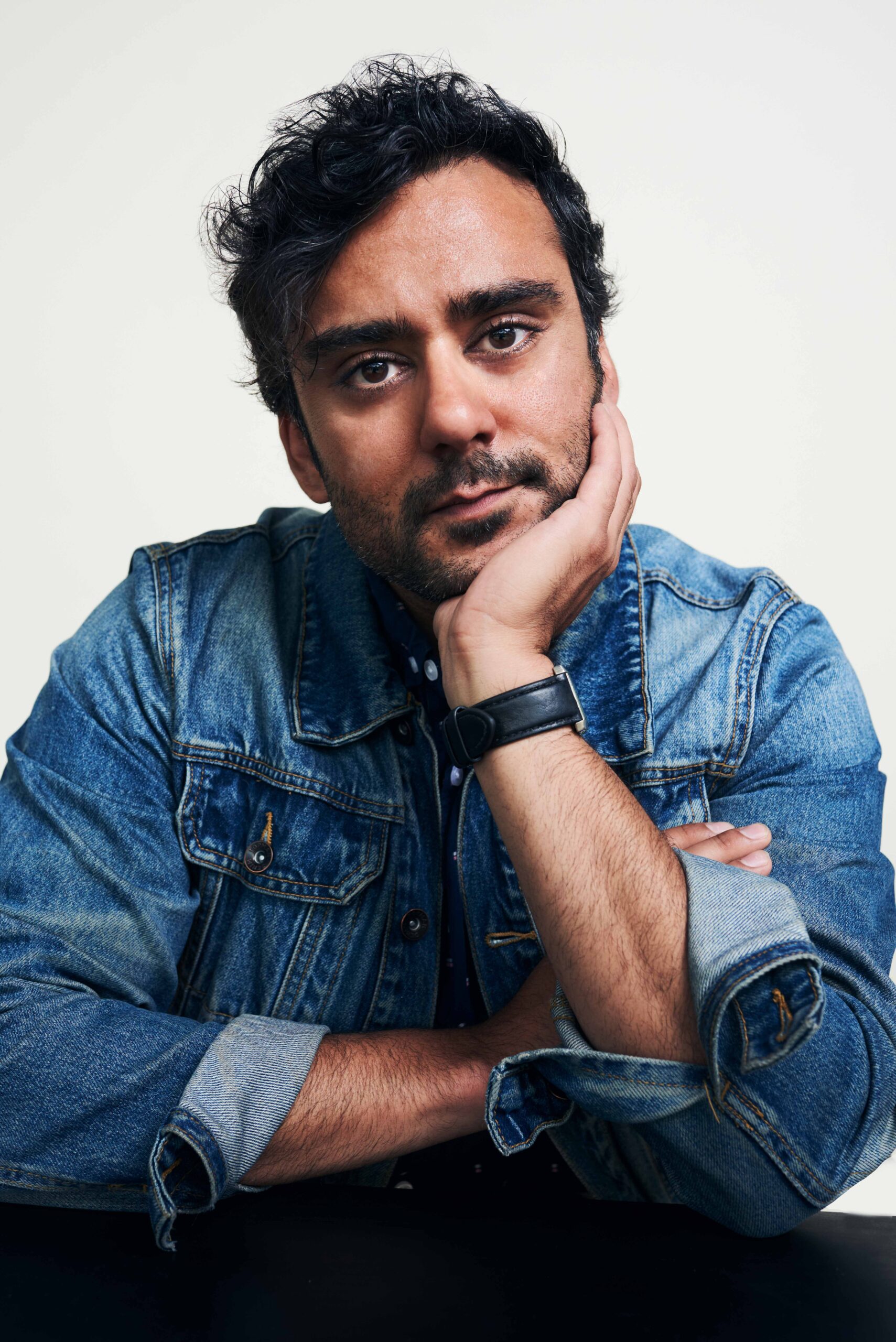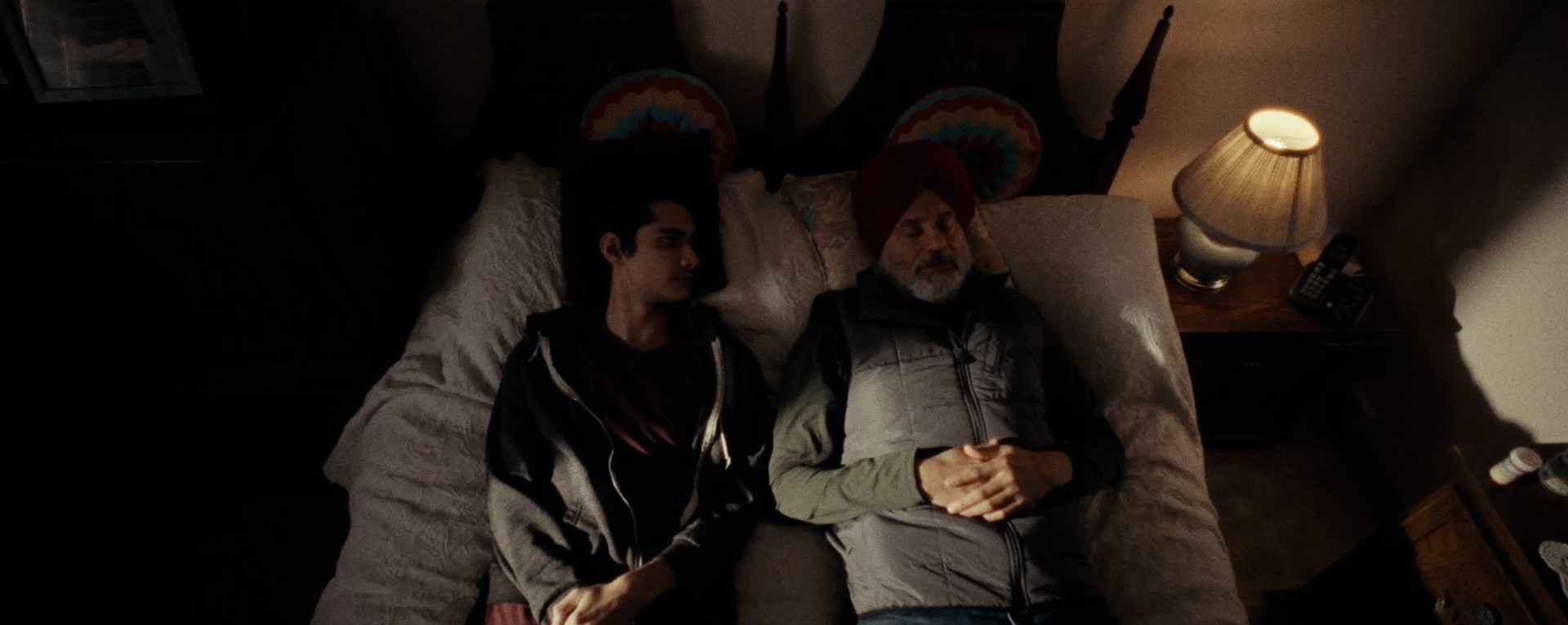Ian Bawa’s “My Son Went Quiet” tells a story of grief and ghosts. In the film, a Father (Harkaran Jhinger) and Son (Jay Vaidyanathan) have just come from a funeral of the young man’s mother. (Father) notices that (son) has stopped talking, perhaps too stunned by the loss and has been left with a debilitating coping mechanism that will hopefully pass. Soon, though, he hears (son) talking to someone through the closed bedroom door. Who is he talking to? We eventually learn (son) is talking to a shadow of his mother. The shadow exists in literal terms for the viewer. We see a shadow in every scene, either standing in the background or sitting in a chair nearby. The mom is still present for both of them.
Bawa’s film is a quiet one, most of it narrated by Jhinger, as if he’s working through the process in the moment and trying to understand its complications and meaning. Those who have lost a parent while living with the remaining parent will recognize this kind of quiet. The process of grief is, of course, different for everyone, but the Father thankfully never tries to console the son or fill him with greeting card platitudes to try and snap him out of it. If the son sees his mother’s shadow in every room, then she must be there. Soon, the shadow will exist for the Father as well. Is it something you have to allow in? Or does the shadow choose you to make itself seen?
“My Son Went Quiet” never veers into the sentimental or melodramatic. So many movies about grief can be described as a “meditation” on the subject and Bawa’s film is no exception, except that it exists in the stillness of grief, truly meditating on the confusion of the moment and how one is meant to cope with it. Bawa’s use of the shadows in the room make every shot look like a haunting photograph, with the characters forced to exist in movement with them. Markus Henkel’s cinematography adds to the sense of loss, with every room feeling more and more empty as time passes, the shadows deceptively filling the spaces, with the lighting remaining appropriately natural.
I’ve only really described the set-up of the movie. There’s more that happens that is meant to convey the circular nature of grief and how we cope with it. For a while, we might feel “sick in the head,” but something always comes around to remind us that we’re alive and we’re meant to express our grief to others in hopes that they’ll just listen and not try to fix it. “My Son Went Quiet” might be a helpful short for people currently going through it. It’s not a cure-all, but it is a film that listens.

How did this come about?
The short answer is that I ripped off Danny Boyle. The long answer is my dad died.
But basically, the night before my dad died, I was rewatching “Trainspotting 2,” and there’s a scene that lasts 10 seconds of Ewen McGregor sitting with his dad, and the dad telling him that the mom died while he was in jail. I thought that image alone told a longer story and was surprised Danny Boyle never explored it more. While sitting with my dad, I wrote this out and took a screencap of the image. (Danny Boyle – if you’re reading this, I’m sorry. But I’m happy to buy you a beer or coffee as a thank you)
The next morning my dad died and I went through a month of grief. By the second month, I wrote two short stories called ‘Black Figures’, that were similar to what the short film would be.
The first story was from the point of view of the dad, and the other was from the point of view of the son. The version of the dad felt more unique because it was a form of therapy for me as I was dealing with my own dad’s death, and relating it to my mom’s death from when I was young.
A few months later, I was presented with the opportunity to get some funding for a short film, so I quickly wrote the short story into a 12 minute script. From there, it was one of the hardest and most rewarding films I’ve ever made, with a lot of emotional highs and lows. It’s vulnerable and too personal at times, to a point where it pains me to watch, but I am deeply proud of it and miss my parents every time I watch it.
Harkaran Jhinger’s narration feels very matter-of-fact and precise. What was your main direction for the narration?
I’ve called the film a ‘broken children’s book’. I wanted the father’s dialogue to be stoic and directly awkward. My father (and I’ll say, a lot of friends with immigrant parents, who can relate to this) will likely agree that there’s a bit of personality type when it comes to certain fathers, from certain cultural backgrounds, of a certain generation.
My father did not share his emotion, and would hide it in his room. Crying was weak to him, and if you were male and crying, he thought something was wrong with you. I was disciplined not to cry. That did not mean my father did not care or talk to me, but his speaking was so direct sometimes that it felt cold and ‘matter-of-fact’. It’s a compliment that Harkaran was able to find this in his ability to take on the role.
If you knew someone going through the grieving process, is there anything you might say to this person before they watched your film?
I think this movie is very therapeutic – for me. I don’t think someone in the grieving process should watch this film because I think it might be triggering.
However, I think someone who is in recovery from grief or in the mourning period, would find it relatedtable, sad, maybe hopeful? The film ends on not a happy note, in my opinion. Life moves on and we learn to adapt and live with our memory. It’s hard for someone who lost someone close to watch this, again, in my opinion. I hope it helps them if they do watch it, but I made the film for me and to create a legacy of my parents and a time in my life that was extremely hard.

What was the biggest challenge in creating the shadow effect?
Hahaha – everything. We did a camera test a year before we went to camera to see if we could actually do the effect practically and to see how long it would be to do. That’s actually how we found Harkaran, who then later casted as the father.
We learnt that we could do the shadow effect practically, if we block shoot the entire film. The issue was that there were so many scenes in the film that it got to be chaos of continuity of costumes, props, lens sizes, etc. We had a great and organized crew and thank god they were on the ball of things. I’m happy we did the shadow effect practically because I feel like it presents itself as more eerie. We basically had everyone (depending on their size and what we need them to do) to create a shadow of their body and then crop them out in post. I would have them breath deeply in, in order to naturally have their body rock back and forth subtly. In the end, it created something more unique and interesting to look at than what I believe CGI could have done.
You dedicated the film to Jagdeep Singh Bawa. Can you tell us something about this person?
My dad! I miss him every day and think about him everyday. My dad was a lion. He scared me as a child. But then my mom died and we had to learn with each other’s grief and loneliness. We became codependent with each other. As my dad got older, his health dwindled and I had to take care of him before his passing in 2020.
The film showcases the time when my mom first passed away, and my dad and I had a hard time talking. We would both secretly cry in our room. I had terrible panic attacks and my dad started taking me to a doctor and then to a counselor. I was put on anti depressants and anti anxiety pills that helped not feel. It was a really hard time for us and my dad just wanted me to be healthy so he didn’t lose me like my mom.
My dad was the source of many of my issues and concerns in my life, but also gave me the strength, knowledge, and ambition to be the person I am. I would force myself to be the best for him and it’s taken me years since his passing to find that energy again. I miss him a lot, and in writing this, I miss him even more.
What’s next for you?
My recent short film, “The Best,” just premiered at TIFF in 2024, and is circulating festivals.
It’s a film that also explores father and son’s and is a pseudo sequel to my short film, “Strong Son,” that premiered at TIFF 2020. I was also funded to make an experimental documentary about my dad and his time working for Canada Post in the 90s.
But more importantly, and the thing that has taken up most of my time as of late is my first feature film, entitled “Strong Son,” (based on the short film of the same name) which is an amalgamation of what I like to call my ‘sad dad series’ (“Strong Son,” “My Son Went Quiet” and “The Best”). “Strong Son” is about a 35 year old south asian bodybuilder who must move back into his elderly father’s place to take care of him, and find balance between his mental and physical health. It’s a film about male toxicity, taking care of your elders, and mental health.
We are going to camera on February 1st and I’m extremely nervous, scared and excited. The script has been worked on for years and despite it being my first feature, I feel like I’ve already been making versions of this movie for years. HOPEFULLY IT ALL GOES WELL SO WISH ME LUCK IF YOU’RE READING THIS!
from Roger Ebert https://ift.tt/uSjmXwF

.png)
.png)


